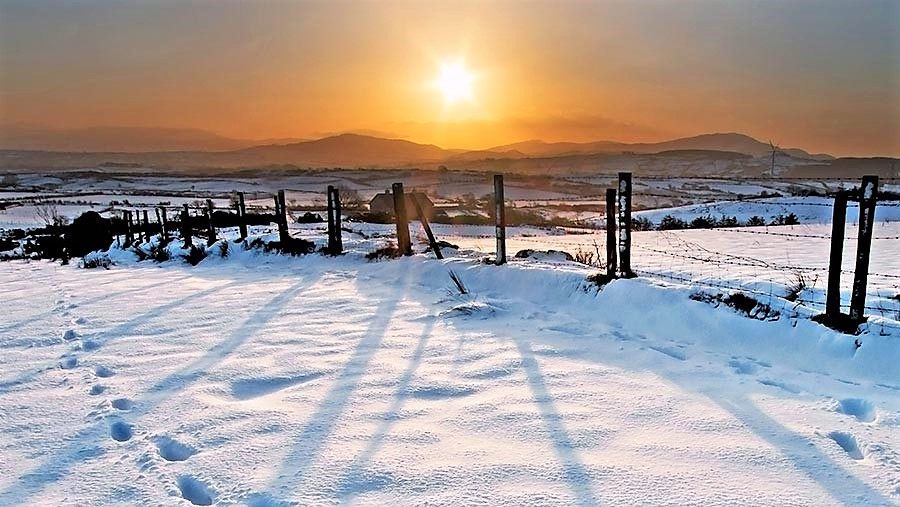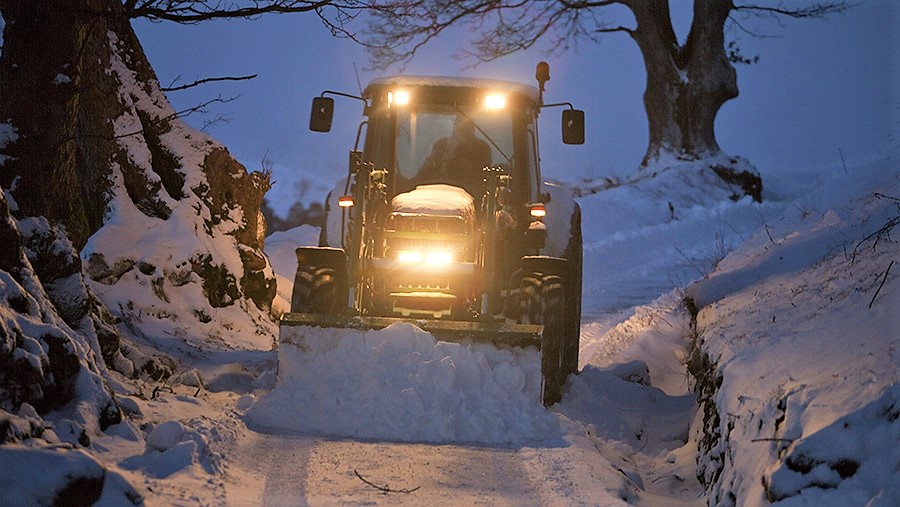Winter time poses many risks on farms due to poor visibility and hazardous weather conditions. There is increased risk of injury during severe weather conditions and most injuries result from slips and falls causing fractures and head injuries.
Plan your day’s work. Aim to finish tasks before late afternoon. Before starting in the morning, have a quick check of your farmyard area to see that all is safe.
With cold, frosty and even snowy mornings becoming regular, the following steps should be carried out:
- Clear a number of tracks around the farmyard, treat with de-icing salt and keep to safe walkways;
- Grit sloped yards and roadways to facilitate traffic;
- Herd out-wintered livestock during daylight hours and be back before nightfall;
- Keep away from hazardous areas and rough terrain;
- Bring a mobile phone when going out herding or on other journeys;
- If rigging up additional lamps and heaters, use the correct wiring and ensure these are protected by a 30 milliamp RCD (Residual Current Device) on the switch or fuse board to prevent electric shocks;
- Plastic covers on fluorescent roof lights should be cleaned where possible and damaged ones replaced. Clean lighting throws out more light.
Areas to Avoid unnecessary risk
Silage pits and bales
Whatever the height of your silage pit, be careful not to slip or fall off it when opening it for the first time. Silage plastic can be very slippery when wet and throwing tyres can easily knock you off balance.
Where possible, take the tyres off with a fork or brush and gather up afterwards with the tractor grab. The biggest risk is under the plastic, where silage may collapse.
The same applies with silage bales, especially when they are in the raised position on the front loader. Never walk under a raised loader and cut open the plastic on the bale while it is resting on the ground.
Walking among cattle
Most cattle are docile creatures and shy away from human interaction. Some, unfortunately, can be temperamental, so don’t get cornered in a cubicle house or shed by a defensive cow who is trying to protect her calf.
If you must treat or tag a calf, try to do this with the cow in a separate pen. Where possible, bring someone with you to watch your back.
Liming cubicles
Liming cubicles sounds like a straightforward and simple job, but done wrongly can cause personal damage. Any type of cubicle lime can be damaging to your health, so it is important to wear a pair of safety goggles and a face mask when spreading it to avoid getting it into your eyes and inhaling it.
Use a scoop or a handheld sieve to lime the cubicles. This not only protects your hands, but also gives a more even spread of material than broadcasting by hand.
Trees and power lines
Assess the environment you are about to go into before you start the chainsaw. There are a lot of trees felled after the recent storms, so take just a few minutes to identify the potential risks.
Always keep a safe distance and never carry out tree-cutting work where the tree or branches or any tools can come within 3m of any power-lines or poles.
Be safe with Farm Machinery
Machinery will be in use on the majority of farms on most days throughout the Winter months – bringing in fodder, pushing in bales or blocks of silage. All machines used need to be in a tip top state of repair.
- Ensure PTO guards are in place.
- Avoid wearing loose clothing or jackets with dangling drawstrings or cords.
- The braking system of the tractor, including the handbrake, needs to be in perfect working condition.
- For a clear view, clean windscreen, mirrors, rear window and side windows on the tractor before starting.
- Plan to carry out all tasks safely. Avoid rushing any job. Drive machinery slowly in farmyards and over rough ground.
- Be Safe, Be Seen – wear a high visibility vest when working near machinery. Keep clear of backing tractors with shear grabs or bale handlers.
- All slurry agitation points must be securely covered and not easily opened.
- Inspect all electrical fittings and replace any that are broken or damaged, if required. Don’t risk substandard fittings; they could be lethal to both man and animal.
- Make a list of repairs needed and get them done. Don’t delay. Do it today. Remember – farm maintenance is a driver of farm efficiency, saves time and labour, reduces problems with livestock and machinery.
To make sure your machinery is winter ready, go to the Maxol Lube Advisor and get the correct oil and antifreeze for your tractor. For more information, click here



